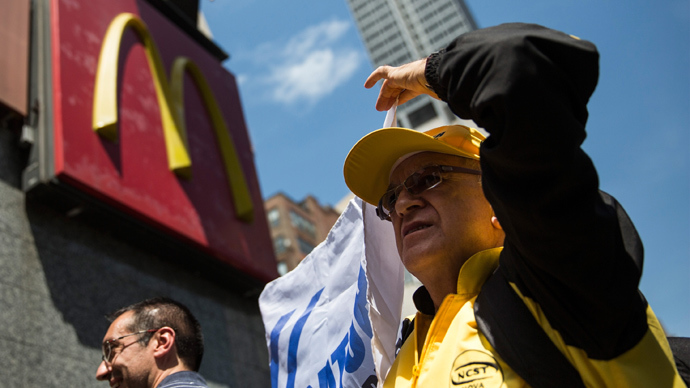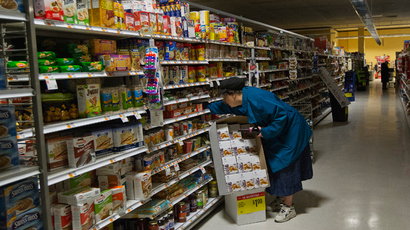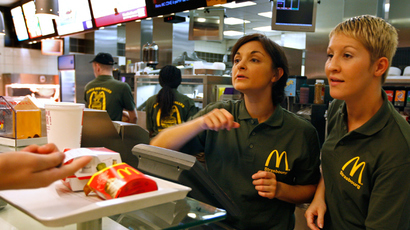More than 100 protesters arrested at McDonald’s HQ demanding fair pay

Over 100 protesters demanding higher wages and improved working conditions were arrested Wednesday outside a McDonald’s corporate office in Oak Brook, Illinois, where thousands assembled to rally against the corporate chain's labor practices.
An estimated 2,000 marched outside the building in suburban Chicago demanding the right to form a union without retaliation and a wage increase to $15 an hour. McDonald’s employees, other food service employees, local church leaders, and union officials were on hand to join in the chants of “Hey McDonald’s You Can’t Hide, We Can See Your Greedy Side” and “No Big Macs, No Fries, Make our Wage Supersize.”
Demonstrators were met with police in riot gear and ordered to disperse. When they instead sat down, blocking the entrance to the McDonald’s building, the police arrested at least 110 people, according to campaign organizers who spoke to the Guardian.
#fastfoodglobal RT @daneyvilla: .@McDonalds#Chicago HQ is looking a bit, different... pic.twitter.com/wsBKB5VFjP p/v @LowPayIsNotOK
— Occupy Chicago (@OccupyChicago) May 21, 2014
These storm troopers were unleased to arrest @SEIU members today & now thier president is thanking cops on twitter. pic.twitter.com/zRqmS5zNaJ
— Occupy Chicago (@OccupyChicago) May 21, 2014
The protest was held one day before a scheduled annual shareholders meeting in which company stakeholders will vote on whether to grant McDonald’s CEO Donald Thompson a $9.5 million pay package. A faction of activist shareholders within the company have previously called on McDonald’s board of directors to slash Thompson’s salary, in part because of the low wages and poor reputation the company has. Another protest is planned for that meeting Thursday.
The company closed part of its corporate headquarters Wednesday and advised approximately 1,500 to 2,000 employees to stay at home. The request, which came in conjunction with the Oak Brook Police Department, was made because the building is located “in a high traffic area, off a major highway and is next to a busy shopping mall. The pedestrian and vehicle traffic and congestion would be unbearable,” a company spokesman told the Wall Street Journal.
UPDATE: More than 100 @McDonalds workers & 35+ supporters have been arrested marching on McD's HQ #FastFoodGlobalpic.twitter.com/F488ig9g5v
— SEIU (@SEIU) May 21, 2014
Wow - insane photos from the protest outside McDonald's HQ demanding higher wages. http://t.co/ouhoO4LL8f Photo/Getty pic.twitter.com/r0pPsL1SUi
— Sally French (@SAFmedia) May 21, 2014
The increased tension comes amid a growing conversation about income inequality in the United States.
Fast food companies, for all the profits they reap, rank at the bottom of employee compensation, with the CEO-to-worker pay ratio sitting at more than 1,000-to-one in 2013. A previous study that examined the seriousness of the situation found that it would take the average McDonald’s employee four months to earn what the CEO earns in an hour: $9,247.
Amanda Wenninghoff travelled from Kansas City to Chicago to participate in the protest. She has worked for the company for ten years but has yet to receive a single raise during that time, struggling to support her family on $8 an hour.
“I have lived in my car with my kids because I haven’t had the wages to support a place for us to live,” Wenninghoff, 28, told the Guardian. “I have friends who need life-saving surgery they can’t afford.”
The problem has become so serious that more than half of American fast food workers rely on government assistance to make up for the small paychecks they earn, even when working a 40-hour workweek, according to a report published in October by economists at the University of California at Berkley.
The study also found that most fast food workers (68-percent) are single or married adults not currently attending school and 26-percent are raising children – debunking the stereotype that mostly teenagers are working at the drive-thru window.
“It would be impossible for me to get by without government assistance,” Wenninghoff said. “The least they can do is pay us enough money so we can afford to live instead of putting it on the taxpayers.”














